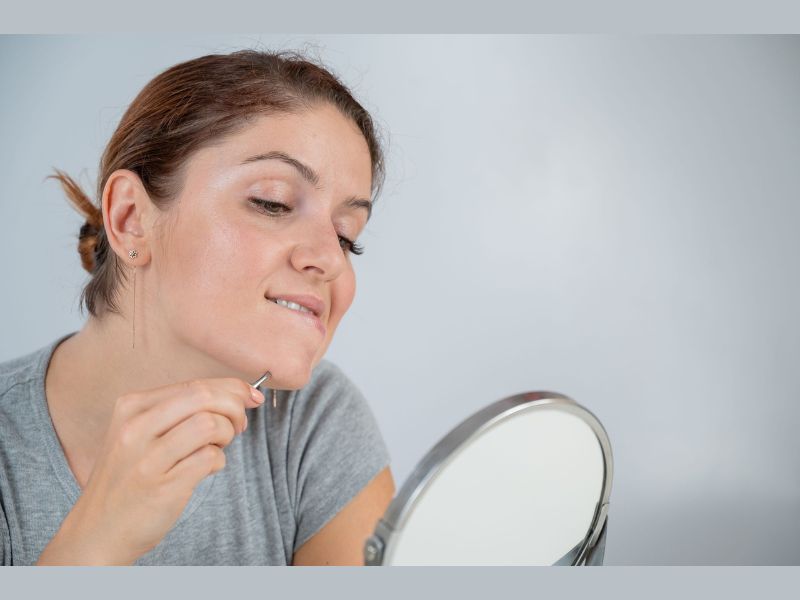Women Pcos Chin Hair: Causes, Effects, and Remedies
Polycystic Ovary Syndrome (PCOS) affects millions of women around the globe, frequently leading to a range of symptoms that go beyond irregular periods or difficulties with fertility. A very distressing and emotionally challenging symptom many women encounter is excess facial hair growth, particularly on the chin. This condition, referred to as hirsutism, is a common but often overlooked element of PCOS that can profoundly impact a woman’s self-worth and emotional health.

In this article, we’ll take a look at why chin hair happens in women with PCOS, what it signifies, and the broad spectrum of treatments—both medical and cosmetic—that can help manage it.
What is PCOS?
Polycystic Ovary Syndrome (PCOS) is a hormonal imbalance that impacts how a woman’s ovaries operate. Common symptoms include:
Irregular or absent menstrual cycles
Ovarian cysts
Weight gain or difficulty with weight loss
Acne and oily skin
Fertility issues
Excess androgen levels (male hormones)
It’s this last point—excess androgens—that’s directly responsible for unwanted facial and body hair, including stubborn chin hair.
Why Does PCOS Cause Chin Hair in Women?
Androgens are typically thought of as male hormones, but women naturally produce them in small quantities. With PCOS, however, the ovaries and adrenal glands may produce higher-than-normal amounts of androgens, particularly testosterone.
This hormonal imbalance stimulates hair follicles, especially in areas like the face, chest, and back—areas where men commonly grow hair. When this happens, it results in hirsutism—coarse, dark hair growing in a male-pattern distribution, including the chin and jawline.
For many women, chin hair may start subtly—just a few hairs that seem darker or thicker than usual. Over time, the number and thickness of hairs may increase if PCOS isn’t managed.
The Emotional Impact of Chin Hair
The presence of chin hair can go beyond just physical discomfort. For numerous women, it’s a daily source of stress and self-consciousness. Some report avoiding social gatherings, skipping dates, or changing their wardrobes to hide facial hair.
Common emotional effects include:
Reduced self-esteem
Anxiety or depression
Body image issues
Shame or embarrassment during personal situations
This emotional toll is just as critical to address as the physical symptoms. Luckily, a mix of treatment options can assist in reducing both the visibility of chin hair and the stress it causes.
Medical Treatments for PCOS-Related Chin Hair
1. Hormonal Birth Control
One of the most common treatments for dealing with hirsutism is combination birth control pills. These pills regulate your menstrual cycle and reduce androgen levels, slowing the hair growth.
How it helps:
Lowers testosterone levels
Slows new hair growth
May improve skin (reducing acne too)
2. Anti-Androgen Medications
Drugs like spironolactone block the effects of androgens on the hair follicles.
Pros:
Effective for reducing facial hair
Can be combined with birth control for better results
Cons:
Requires prescription
Not safe during pregnancy (can affect a male fetus)
3. Insulin-Sensitizing Drugs
As many women with PCOS have insulin resistance, medications like metformin may help by treating the root metabolic problems. Lower insulin levels can indirectly lower androgen production.

Cosmetic and Hair Removal Options
While medical treatments take time, most women want immediate solutions. Here are some effective cosmetic and hair removal techniques:
1. Plucking or Tweezing
Good for removing a few stray hairs. However, regular plucking can irritate the skin or lead to ingrown hairs.
2. Waxing or Threading
These methods remove hair at the root, offering smoother skin for 2–4 weeks. Can be painful and may cause redness or inflammation.
3. Depilatory Creams
Chemical-based creams dissolve hair just below the skin’s surface. They are quick and painless but may irritate sensitive skin.
4. Laser Hair Removal
Laser treatments target hair follicles with light to reduce future growth.
Pros:
Long-term reduction
Works best on dark hair and light skin
Cons:
Requires multiple sessions
Can be expensive
Not equally effective for all skin tones
5. Electrolysis
This method uses electric current to permanently destroy hair follicles.
Pros:
FDA-approved for permanent hair removal
Effective for all hair types and skin tones
Cons:
Time-consuming (each hair treated individually)
Can be painful and requires multiple sessions
Lifestyle and Natural Remedies
Although not a replacement for medical treatment, certain lifestyle changes and natural remedies may help balance hormones and reduce symptoms over time.
1. Diet and Exercise
Maintaining a healthy weight and a balanced diet can reduce insulin resistance and, in turn, lower androgen levels. Try incorporating:
Low-glycemic foods (whole grains, legumes, vegetables)
Lean protein
Regular physical activity (at least 30 minutes, 5 days a week)
2. Spearmint Tea
Some studies suggest that spearmint tea may help lower testosterone levels when consumed regularly.
3. Supplements
Supplements like inositol, vitamin D, and zinc have shown potential in managing PCOS symptoms naturally.
Always talk to a healthcare provider before starting any supplement.
When to See a Doctor
If you’re noticing a sudden increase in facial or chin hair, or if hair growth is affecting your quality of life, it’s time to consult a doctor. A combination of blood tests, ultrasounds, and medical history can help confirm a PCOS diagnosis and rule out other conditions like:
Congenital adrenal hyperplasia
Cushing’s syndrome
Androgen-secreting tumors (rare)

Final Thoughts
PCOS is a complex condition, and symptoms like chin hair can be particularly upsetting for women. But with proper care, understanding, and the right treatment approach, it can be handled effectively. You are not alone—and your experience is valid.
Whether you choose to embrace your body hair, remove it, or treat it medically, the most important step is making a decision that empowers you and supports your overall health.
You deserve to feel confident in your skin—chin hair or not.Women Pcos Chin Hair,Women Pcos Chin Hair
